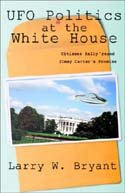

Written by Larry W. Bryant
Published by Invisible College Press
By far the most forthcoming (or at least publicly open-minded) of any politician in recent decades, Jimmy Carter gained his greatest notoriety in the fringe community for his campaign promise to release any and all information pertaining to the government/military study of Unidentified Flying Objects. He swore he would blow away the smokescreen that had surrounded things like Project Bluebook and Majestic-12, and indeed even made references to strange experiences of his own during his stump speeches on the subject.
Then he was elected POTUS. And the issue of UFOs never came up again. No documents were released, no official word came down from on high, no confirmation was given to those that claimed they had seen something more than swamp gas and weather balloons. In UFO Politics at the White House, author Larry Bryant collects the hundreds of resulting letters written to Carter by various members of the public, all wanting to know what happened to his campaign promise to talk about UFOs openly and release material related to them to the public.
As it stands, the book is an excellent resource for UFOoligists interested in the mid- to late 70s of American political philosophy regarding the issue, or for those looking to gain a greater perspective on those members of the public that claim to have been affected by UFOs. Unfortunately, the "author" makes no real use of those resources to ask interesting questions or explore possible political causes of Carter's silence. I place the term "author" in quotes, as the entire book contains perhaps a couple of thousand words attributable to Mr. Bryant. The book is simply an anthology of other people's letters, with no framing commentary, no discussion, nothing. Other than a two-page foreword and equally short epilogue, Bryant's voice is silent. I think perhaps "Compiled by Larry W. Bryant" would be a more accurate cover attribution, but so be it.
Ultimately, the book suffers from this lack of a guiding hand to generate some discussion. The letters range all over the map from carefully considered epistles from obviously intelligent people to barely literate backwater hicks and the occasional 12-year-old, who contribute very little to the usefulness of the book as a research tool (except to confirm unpleasant stereotypes about those that claim to have seen things or been abducted).
Had Bryant made some attempt to discuss the possible causes of Carter's failure to answer these letters or keep his promise, or even investigated what might have been going on behind closed doors to keep the government's secrets safe, then this could have been a very interesting book indeed. Without some actual discussion of the titular issue, though, the book rapidly loses reader appeal. The letters are, for the most part, incredibly similar, and follow the formula of "Hi. I am John Doe. I too had experiences with UFOS. [relates experience]. Please release government UFO info. Yours, John Doe." The few exceptions to this formula are typically the most entertaining reading in the book, though they split 50/50 between knuckle-draggers and erudite writers with considered opinions.
Doc's Diagnosis: If you're a hardcore UFO nut, or collector of obscure Carter Presidency arcana, then this one might bear purchasing. Otherwise, I can't imagine why you'd bother. Especially since most of those letters are readily available via the Freedom of Information Act, meaning that you, too, could compile several hundred letters and claim to be an author.
Grade: D
Discuss the review in the Needcoffee.com Gabfest!
Greetings to our visitors from offsite!
Stick around and have some coffee!